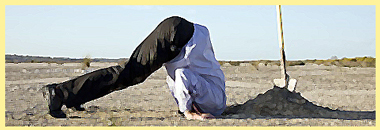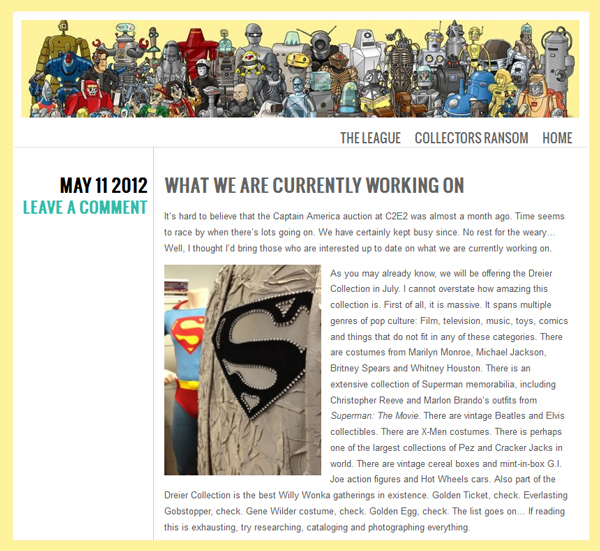As a follow-up to the public dialogue last month between myself and Fong Sam, the General Manager for Profiles in History (see “Profiles in History Pledges More Transparency; Open Q&A On Website Regarding Provenance, Authenticity, Other Questions”), Fong has published a new response today on his Haxbee.com site (see “What We Are Currently Working On”). Though this was touched on as closing out one of many topics, I thought it would be productive to reply with further thoughts and opinions on my part. I am pleased to see that the topic is still under deliberations at Profiles and hope that it will eventually result in some kind of additional communications platform between them, their customers, and other interested parties.Below is the link to the new article, and further below the excerpt from Fong’s article that relates to our ongoing discussion, though I recommend reading the full article on his site for context:
In the middle of all this (or on top of it all–I’m not sure which phrase fits better), I’m still thinking about Profiles’s eventual website overhaul. As previously mentioned, I am striving to make Profiles, as a company, more user-friendly. This means more engagement and increased approachability. Jason DeBord took this as being more open and transparent, and even offered suggestions on how to do so. The first step toward open engagement is providing a platform for discourse and dialogue. The difficulty, as Jason can attest to, is in the execution.
Whether it be in the form of a blog, web forum or public Q&A, the concerns are the same. In an open environment, how do you filter the relevant comments among the inevitable cacophony of noise and still maintain the desired openness? If you require participants to log in in order to view and post, then you’re just building a walled garden. That’s not open. To what degree do you moderate? How do you prevent trolls? How do you prevent dissenters who ultimately just want to undermine your efforts? If you are banning users, deleting posts, or altering comments, then that’s not open either. There is plenty to consider. The system must be efficient, useful, fair and trustworthy. Otherwise, it would be joke. No one would take it–and us–seriously.
Then there’s finding the time to operate this endeavor. This is a full-time job. The current workload is already stretching our limits. To add on another project is masochistic. Yet, I still believe it’s possible. Not just building and implement this vision, but to also maintain an effective open forum. I believe in community and that increase in participation will result in raising your own value. The disagreement may only be in how to make it happen.
Interesting points, Fong – thanks for sharing your thoughts.
While in my article I articulated some of the possible hurdles and challenges that would be involved in fielding and answering questions, I think the biggest task is figuring out how to do so in a productive way without overthinking it.
The fact is, you have no control over who asks questions, or when and how they are asked.
There are many questions about Profiles in History, how their business and auctions operate, as well as outstanding questions about specific pieces that have been floating around for years – they’ve just never been addressed. There’s that old adage – no answer is still an answer. People talk and gossip, and people assume that some of those questions floating around out there are not unfamiliar to the people at Profiles in History.
The consequence is that people then suspect that they’ve never been answered because there isn’t a good answer… and the impact of that is, for some, your (collective your – Profiles in History as a company) reputation takes a hit. This may cause some to decide to be more self reliant in terms of doing their own, pre-auction authentication work, or maybe to exclude Profiles in History as a potential buying source. Questions that come to my mind are about some pieces that have been sold in the past, some sources of material (openly promoted as such on the Hollywood Treasure television show), as well as other areas of interest.
I don’t know… I always like to think that there is no bad question, though I’m sure someone could come up with an example that might make me change my mind. But if the impulse is to devise a system to filter out uncomfortable questions, or to create an atmosphere where maybe people would be afraid to ask certain questions… I’m not sure how helpful that would be either.
Believe it or not, there are even questions I have (based on private discussions with a variety of individuals over the years) that I would not feel comfortable asking.
The other problem is, some people aren’t sophisticated enough to distinguish the difference between asking a question and making an accusation…
I can guarantee you a handful of people in this field will make it their mission to make your efforts backfire, either by devising questions you cannot answer, or forcing you to completely abandon the endeavor out of frustration. The fact is you are a successful company, and success breeds jealousy and brings out the worst in people.
Having said that, there are also people with positive intent with legitimate global questions, and who could serve to be invaluable in raising questions about pieces in your future auctions, prior to the auction date, and perhaps assist in helping to prevent the sale of material that is not genuine, or as described in your auction catalogs.
Maybe one solution would be to have “questions” submitted to an unbiased third party, who could then translate them into appropriate, respectful, actual questions? Then at least there would some consistency in the process, and emotions and/or negativity that might otherwise arise from the process, on the part of the questioner and Profiles, would at least be minimized.
In the end, no one can prevent anyone from asking a question, wherever it might be aired (and as you intimated in your original article on the topic, currently much of this happens among hobbyists on various discussion forums, which you have thus far elected not to take part it). It really comes down to whether you really want to officially, on the record, hear these questions or not, and up to you on creating a platform or process by which you acknowledge and address them. Or not. I remain hopeful, as always.
Jason DeBord


